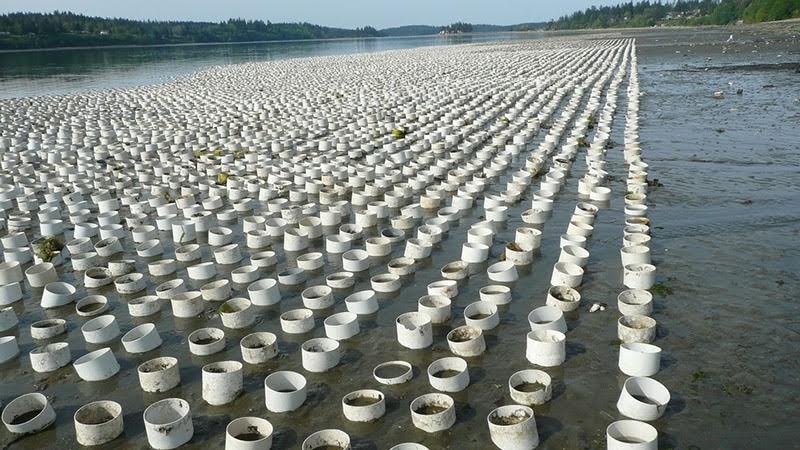By Kirk Kirkland
In the beginning there were four environmental groups working together to stop Taylor Shellfish from getting a permit for the largest Industrial aquaculture proposal in Pierce County. At their first hearing before the County’s Hearing Examiner, these groups presented a long list of issues to stop the permit for a 30 acre Industrial Aquaculture site.
One of those issues asked the County Hearing Examiner to require a Cumulative Impact Analysis (CIA) that would evaluate the impacts on eelgrass and decline of shorebirds caused by harvesting geoducks and planting activities that destroyed eelgrass and fish habitat.
Such a Cumulative Impact Analysis was required by a Federal District Court in Seattle in 2019 after the judge revoked 900 permits in Puget Sound and Hood Canal. He required a CIA for all new permits. The Judge also specified the Army Corps of Engineers were not to use Environmental Assessments to evaluate for new permits.
Since 2020 the Army Corps of engineers has ignored the judge’s decision and handed out over 300 permits using Individual Letters, Letters of permission and Environmental Assessments that do not address cumulative impacts of geoducks. In addition, Thurston and Pierce Counties also handed out permits without a CIA. In Pierce County ‘s Environmental Impact Statement, it said there were only minor impacts and didn’t require an analysis of total impacts of all geoduck farms in the county.
To force Pierce County planning department to obey the Federal Court requirement for an adequate analysis and provide mitigation for the loss of fish, bird and wildlife habitat, the coalition partners hoped to appeal the county’s Conditional Use Permit to county Superior Court and then to the State Court of Appeals.
In the week before appealing the permit to the Shoreline Hearing Board, in conversations with the attorney for the Burley Lagoon, he indicated that the legal cost would be over $40,000 to appeal our case to Shoreline Board and then to Pierce County Superior Court.
With just a week to go before filing the appeal, I told the attorney that I was not able to fundraise that amount or even a partial payment. We discussed making a down payment of $4,000 and paying off the bill during the months between court appeals as I had done before.
In several land use permits when I made the journey to the State Court of Appeals, the total cost was $80,000. But the attorney wouldn’t budge. He wanted monthly bills paid up front before the hearing.
Across Pierce County, the Spanaway Concerned Citizens have been involved with a similar environmental appeal of a county permit that needed an Environmental Impact Statement. Last I heard they had paid over $150,000 for their journey from Growth Management Board to a decision before Superior Court Judge. They now must decide if their case is strong enough to invest in a trip to the State Court of Appeals.
Friends of Burley Lagoon and the Coalition to Protect Puget Sound Habitat, filed their appeal to Shoreline Hearings Board and prepared to plead their own case without an attorney. They had the help of a retired county planner and other people who had filed appeals and argued their case without an attorney.
In February 2025, the Coalition and Friends met the deadline for their appeal. Then, before going to a public hearing, the Shoreline Hearing Board SHB offered the parties an opportunity to mediate before continuing to litigation.
In April 2025 after two days of mediation facilitated by an SHB mediator, and after much intense deliberation, they reached a Settlement Agreement.
This Agreement was a compromise that removed any further chance of taking outstanding issues to a higher court of appeal. The concessions made by Taylor Shellfish were significant. They resolved issues that included restoration of native oyster beds and created ecological reserves areas within the lagoon.
Taylor also agreed to mitigation measures that protected subtidal areas and stream channels. Such mitigation has not been seen before in any other county Conditional Use Permit in Puget Sound.
The most unique part of the agreement was the creation of a Cooperative that is tasked with protecting and restoring the natural resources of the lagoon. The Cooperative’s task is to design and implement a functioning no net loss model for an ecologically managed estuary.
This Burley Lagoon settlement could become a blueprint for future Shoreline Hearing Board appeal settlements. Especially in those groups who appealed their permit without an attorney.
A cash settlement is rare in a Shoreline Board Appeal, but Taylor Shellfish agreed to contribute $30,000 and FOBL agreed to a $3,000 donation for the design and implementation by the Cooperative.
In many ways the Settlement Agreement went beyond what can be agreed upon in a higher Court of Appeal. Problems with night harvesting was addressed. This is a major win for residential bays like Burley Lagoon. The list of wins are significant. Taylor agreed to the following:
- Active aquaculture operations will not exceed 175 acres of the 300+ leased acres within Burley Lagoon. And geoduck operations will not exceed 25.5 acres. And 18 acres of subtidal area will not be used for any aquaculture as long as the geoduck farm operates.
- Shellfish operations will not take place in the streamway channels and that no area used for geoduck aquaculture will be within 250 feet of an existing residential structure.
- Geoduck operations will not occur before 8:00 a.m. or after 5:00 p.m. every day of the year.
- Chemicals, pesticides, herbicides, processed feeds, or net pens will not be used within Burley Lagoon or within 200 feet to the south of the spit.
- Maintain existing debris collection practices and provide a phone number to call when marine litter pick up is needed; and they
- Agreed to devote at least two contiguous acres to native Olympia oyster restoration with no aquaculture harvesting.
Bruce Morse told the News Tribune’s reporter that he had gotten a lot of positive feedback from residents about the settlement. “I think in general, people are kind of tired and just want to get on with life.” Bruce Morse is Burley Lagoon resident, who participated in discussions with Taylor Shellfish Company to agree on a settlement. “The fact that we can set up this cooperative and actually promote and encourage good stewardship of the lagoon — I think people are excited about that as well.”


